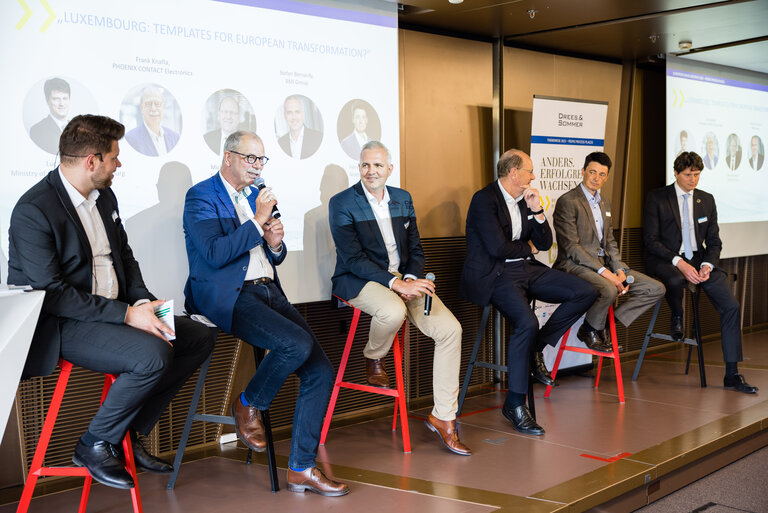"Redefining. Growth. Successfully." - how to transform in turbulent times? This question was the focus of this year's European Dialog Initiative in Luxembourg. As guests at ArcelorMittal, Drees & Sommer Luxembourg Managing Director Maximilien Ast and Senior Consultant Michael Konopka welcomed the guests, including pioneers of the Twin Transformation.
The European Dialog Initiative is an interdisciplinary, cross-industry and cross-national dialogue initiative by Drees & Sommer which, together with partners, experts and hosts, addresses and discusses aspects of analogue and digital transformation at different locations year after year. In addition to various stops throughout the year in the DACH region, this year's European Dialog Initiative also stopped in Luxembourg and Belgium.
Decarbonisation of the steel industry
Nicoleta Popa, Head of ArcelorMittal global R&D construction applications, infrastructures and long products, referred about material and design efficiency in her keynote speech introducing the event. She emphasised the urgent need for the construction industry to achieve net zero emissions by 2050 and the significant impact of the construction sector on global greenhouse gas emissions. Popa outlined the various challenges facing the industry and discussed possible solutions, including the use of various technologies such as Terrafon and Steelanol. She stressed the importance of choosing the right steel, optimising the construction process and reducing carbon emissions. The audience had several insightful questions, ranging from the availability of technologies to the cost differences between classic and green steel.
Luxembourg's evolution towards a sustainable and digital economy
The second keynote speaker, Luc Decker, Deputy Chief of Staff of the Luxembourg Minister of Economy, examined how Luxembourg has managed economic change throughout history - from the first industrial revolution to the current twin transformation, the evolution towards a sustainable and digital economy. He pointed to key events such as the dismantling of Luxembourg's fortress and the country's involvement in the steel industry. Decker emphasised Luxembourg's ability to adapt and embrace change, pointing to its successful transition from an economy focused on steel production to a financial economy.
Transformation of industry, mobility and urban development
This was followed by impulse speeches on digital twins of the future by Artyom Yukhin, President and CEO of Artec 3D, and on future people flow management by Kai Pabelick, Head of Business Line People & Object Sensing at IEE. Both speakers addressed the potential of technology and digitalisation to revolutionise their respective fields.
Joost Ortjens, Head of International Business Development Digital Applications at Luxinnovation, spoke about Luxembourg's innovative approach to mobility. He emphasised the need for cross-border solutions and discussed the impact of mobility on the urban infrastructure and commuter flows. The audience had a lively discussion about the impact of free public transport use and the legislative changes needed to make such changes possible.
Yves Biwer, director and coordinator of the Metzeschmelz quartier, presented the plans to transform former industrial wastelands into urban districts. He spoke about involving citizens in the development process, preserving cultural heritage and creating a sense of belonging. The audience asked questions about housing clusters, social housing and the future of car ownership.
Luxembourg as a model for European transformation
The event closed with a panel discussion on Luxembourg's potential as a role model for digital and sustainable transformation in Europe. The panellists commended Luxembourg's long-term strategy, clear vision and cooperation between politics, business and industry. They stressed the importance of inclusion, changing habits and the responsibility of businesses and consumers in achieving a sustainable future. The panellists also pointed out the need for dialogue with EU institutions and the role of technology in driving change.
In summary, the European Dialog Initiative provided valuable insights into Luxembourg's success in the Twin Transition. The event highlighted the small country's commitment to innovation, sustainability and collaboration. Participants were impressed by the speed and scale of Luxembourg's processes and expressed a desire to apply the Luxembourg mentality across Europe. The day ended with networking and an aperitif, which provided an opportunity for further discussions and contacts between the participants.
About Drees & Sommer Luxembourg
As a leading international consulting and project implementation company, Drees & Sommer supports private and public clients in all matters relating to real estate, infrastructure and industry. Through forward-looking consulting, the company offers solutions for successful buildings, high-yield portfolios, efficient infrastructure and liveable cities.
Drees & Sommer provides all services under the premise of combining economy and ecology, communicated as "the blue way". The company, which has been partner-managed for over 50 years, has its headquarters in Stuttgart (Germany) and more than 5,300 employees at 59 locations worldwide. Drees & Sommer has been represented in Luxembourg for 20 years with a steadily growing team of currently over 100 employees.
Follow us on Linkedin to keep up to date with our activities.
Press contact: Birgit Kirchner (Marketing Manager), birgit.kirchner(at)dreso.com, Tel +352 2612055602
